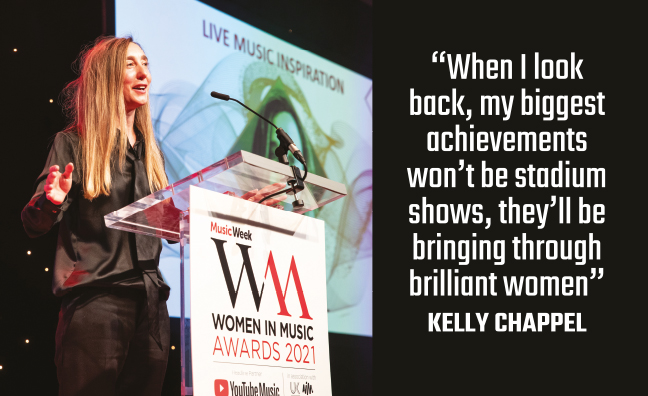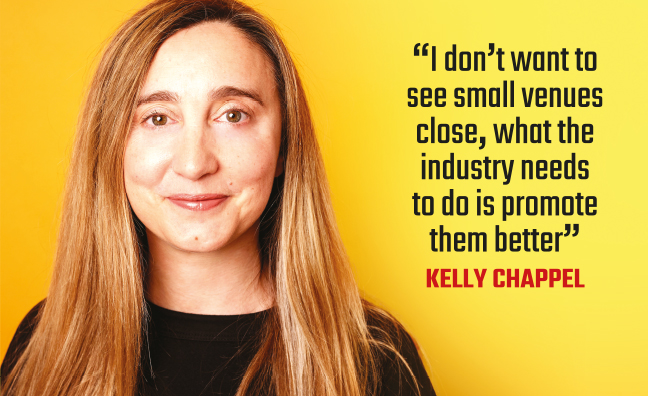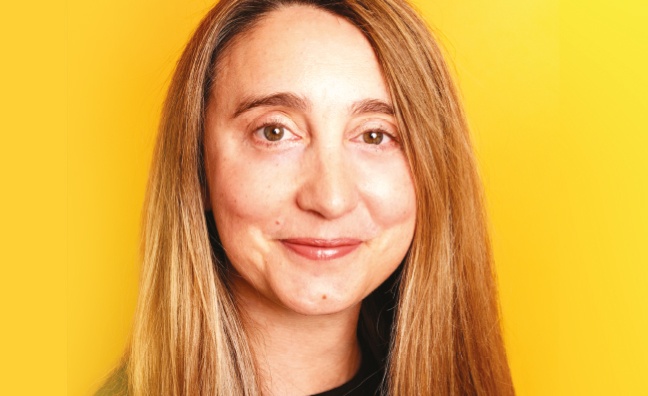Over the course of almost two decades at Live Nation, Kelly Chappel has become one of the most successful promoters of her generation and now boasts a roster including Billie Eilish, Dua Lipa and Ariana Grande. Now based in LA, Chappel’s mission to forge a fairer and more equal music industry is stepping up a gear, as she tells Music Week...
WORDS: ANNA FIELDING
“Look,” begins Kelly Chappel. “When I was a little Geordie girl growing up, I didn’t think I’d make it to London, let alone Los Angeles. When I think about the winding road I’ve travelled to get to where I am, it does seem a million miles from where I’ve come from.”
Los Angeles is where the executive is now, just three weeks into a new job as Live Nation’s EVP of global artist development and global tour promoter.
“I’ve always done artist development and there’s nothing like finding an artist at the start of their career and working with them until they are at stadium level,” she says, settling in for a conversation with Music Week in the middle of a visit to London. “But in this new role, I want to be able to think about how we can work better with artists – and artists at all stages, because everyone is still developing.”
Chappel, who won the Live Music Inspiration Award at last year’s Music Week Women In Music Awards, makes it clear that her brain is buzzing with new ideas. Sitting in an office at Live Nation HQ in London, Chappel is an effervescent presence.
“It could be that we look at new platforms for ticketing or marketing,” she posits. “What can we manage when it comes to essential functions for new artists? How can we sit down with artists and managers and work out new strategies, rather than just saying, ‘We’ll stick you in a 100-capacity venue and go from there.’ I want to get down and dirty, get really granular about how we develop an artist.”
Chappel has been with Live Nation for almost 18 years, but her first job in London was working as a manager at Gascogne, a St John’s Wood restaurant owned by the late Andy Fletcher of Depeche Mode, who passed away this year.
“And God rest his soul,” she says.
From there, she moved into managing emerging bands, scouting for PIAS and running club nights. As a manager, she took her acts on tour (“Which was driving a white van and sharing rooms with a load of sweaty boys,” she says). In a conversation with Music Week last year she said this experience turned her into “a road warrior”.
In essence, not much has changed, although the working conditions are somewhat better.
“I’m going to New York next week and I have five or six gigs back-to-back,” she says. “And it’s good to be back doing that many shows in a row. Fifteen to 17 years ago, I was doing that in 200-capacity venues and now it’s arenas and stadiums. It’s a slightly nicer experience with the catering!”
Kelly Chappel is usually the person who tasks herself with creating the best experience for other people. She cares very much about the artists she works with, about their health, their careers and how they manage the stresses and strains of touring. She’s a dedicated mentor of younger executives and has been a strong advocate for women across the industry and for equality across the board. She has an active role in the Live Nation Women Fund, which launched in 2018 with the aim of empowering women in the live music business.
And with the likes of Billie Eilish, Dua Lipa, Ariana Grande, Olivia Rodrigo, Rosalía, Lizzo, Arlo Parks and more on her star-studded roster, Chappel is at the centre of some the biggest success stories in modern pop.
“My absolute passion, the reason I do this job, is still the music,” she affirms. “I may have joked it was the catering, but it’s all about the music and that’s a real joy.”

With that, we get stuck into an animated conversation that will take in empowerment, new talent and the future of the live business.
Let’s start at the beginning. Growing up in the North East, what motivated you at the start of your career?
“What motivated me back then was getting out of the place I was living in. We lived just outside of Newcastle – which is the best city in the world – but I knew there was something bigger out there. At the time, I wanted to be a radio DJ and I knew that if I wanted to get into some sort of entertainment, then that meant living in London. I wanted to be where everything happened, like when you switched on the TV and saw footage of the 1960s with everyone walking down Carnaby Street.”
And what motivates you now?
“The whole world. The world is a really big and interesting place. I am very, very fortunate and I will never take for granted that I have been able to travel and to see so much, and now I’m working in another country. I’m very motivated by change, growing myself and in my career, meeting and working with new people, seeing how the industry works in a different city, and not as a visitor.”
What do you feel you can do in your new role that you weren’t able to do before?
“I facilitate a lot of tours across the UK and in Europe and I do it at a higher level. The artists I work with are at arena level, and as you get increasingly busy, you’re in the trenches, [although] I know being in the trenches at arenas doesn’t exactly sound unglamorous. But now I’ve got a little bit more breathing space, I want to take a step back and look at how we do everything. I don’t necessarily want to be doing what I was doing when I first started my career. Let’s look at what’s changed since then. As an example, obviously social media is one of those things. There’s a young female artist that I’m beginning to work with who’s on the road at the moment and she’s absolutely fantastic. She’s supporting a big act on a stadium tour. She often puts things up on her Instagram about mental health, or how she’s feeling. Now, previously I wouldn’t have known about that. But now I can be more in tune with it.”
Last year, you won a Music Week Women In Music Award and you were also one of the first to be added to the Roll Of Honour in 2014. Do you feel you have been able to make changes for women in the industry?
“I have had people say, ‘Watching you and seeing how you’ve done it and seeing how well you’ve done has definitely inspired me.’ I’ve never really changed who I am or tried to fit in with the guys. I do think some of the younger girls look up to me, and some of the younger boys in the office too. I think what I’ve shown is that, with tenacity and just sticking it out, you can do it. It is a tough job. As a promoter, I am always looking around, on Zoom calls or when we do festivals, and it’s been nice to see more female faces pop up. I like to think I’ve played a small part in that in the promoting world. I did a mentoring programme during the pandemic and the organiser said that loads of people had asked for me. That was really nice. I must have done something right, but maybe I’ve just stuck it out, stubbornly.”
Speaking of mentoring, you’ve said that for people coming up in the industry, the best way to get ahead is to meet senior people for coffee. Does that still stand in an era of Covid and TikTok?
“It’s been a funny old time, but I think we’re coming back strong. I’m seeing someone in two weeks for a coffee, actually. I think it’s still worth sending people emails and asking for 10 minutes of their time.”
In terms of up-and-coming talent on the executive side, who should the industry be looking at?
“There’s Steffani James who’s in our office. She started with me two months before we left the office [in 2020] and everything went onto Zoom, and I couldn’t have got through the pandemic without her. She’s an absolute star, really brilliant. Phoebe Holley [of WME] was an assistant to Lucy Dickins and is now a booker. Again, she is brilliant. Then Maddie Arnold at Live Nation, who is a young promoter. I remember her doing her first weekly promoter call in the UK and being nervous, but I said, ‘You’re brilliant, your ears are amazing, you’ve got it!’ And she was amazing. To be in the early part of your career and to have worked through the pandemic and to still be standing…”
Following on from the pandemic, how has 2022 been for Live Nation as a whole?
“After the pandemic, everybody wanted to tour and, happily, people wanted to go and see gigs. We’re having a record year and I think it’s the start of many more strong years. With so many acts wanting to tour, it’s been a bit of a nightmare trying to get a whole tour in across the UK and Europe – there are only 365 days in a year. But I think it’s a positive because it means everybody is out there and wanting to work. Most of the world has fully reopened and thankfully live music is at the top of many people’s lists. The number of people wanting to go to concerts, watch music or stream music is really high. We have to be mindful of the energy crisis and the cost of things going up. But I don’t think it’s going to stop people going to live shows. We sold over 100 million tickets, worldwide, from July to July in the past year.”
How has the company changed since March last year?
“Right now I see a real spring in everyone’s step. And I don’t think this is just Live Nation, there’s been a little bit more sensitivity and checking in on people around mental health. I think people have had their struggles, perhaps those who wouldn’t have expected to have struggles, and come back a bit more enlightened. The younger generation has been very good at this anyway, but it’s good to see it happening across the board.”
Circling back to the cost-of-living crisis and rising energy bills, aren’t we in a worrying time for live music?
“I mean, it’s a worry for everyone. It’d be remiss of me not to say that. But I think it’s something we’ve got to battle through as we have done before. You know, the gig industry isn’t new. And we’ve had recessions and other tragic world events happen. I think we’ve got such a great team of experts around us that we will get through it. The great thing about live, which we proved with the pandemic, is that we will always come back fighting and come back stronger and that’s because music is so powerful. So, yes, it’s a worry. Yes, it will affect us. But like I said before, I think people will still go and want to see live music and still want to stand in a field with their friends and drink a beer, even if that beer is slightly more expensive.”
Grassroots venues are less well-placed to withstand tough economic times. What should the industry as a whole be doing to support them?
“You keep on putting acts in those venues. There’s sometimes a tendency to put artists in slightly bigger venues than they would have been booked in previously, because of numbers on TikTok and so on. So where you once may have gone to a 100-capacity venue, you now look at the million streams and put someone in a 1,000-capacity venue. But the way we support these venues is by using them. One of my favourite venues ever was The Luminaire in Kilburn. I actually shed a tear when that closed [in 2011]. I don’t want to see small venues close. There’s nothing better than saying you saw someone in a smaller venue. What we need is to promote these venues better, that’s the thing. Maybe by some bigger artists going and playing in them as a treat for fans. That could be a really great idea.”

Do you have a foolproof plan for developing new artists?
“Listen to young people. I’m really fortunate that I get to speak to the next generation of young promoters on a daily basis, and if they tell me something’s good, then I’ll listen. The younger Live Nation promoters across Europe have tipped me off on so much in the last few years. And I think to be fair, our team’s pretty foolproof. I know this sounds a bit, ‘Cut me and I bleed Live Nation,’ but, you know, if Karolina [Hansen, promoter] in Sweden sends me an act then I’m going to listen. Listening has always stood me in good stead. It’s the key to my success.”
What has been the best show you’ve promoted so far this year?
“Oh please, oh no. Don’t make me choose!”
Okay then, what’s been the most difficult?
“Well, I promoted six O2 shows with Billie Eilish, hers is possibly one of the nicest camps in the world to work with. But while we were doing the Billie shows, we also did a show at the O2 for Maggie [Baird], her mum, and her charity Overheated. And that took a lot of work. It wasn’t in any way because any of the people were difficult, but doing six main shows with another show on the side was quite a lot. I was proud to be a very small part of it, but it was tough to juggle.”
And is there a tour coming up that you’re particularly excited about?
“There’s so much. I’m really looking forward to PinkPantheress’ UK tour. I really think she’s going to become massive in the next year. We’re about to go on sale with a little tour and it’s so exciting to know that I’ll be able to watch the growth of it and of her in the coming months.”
Last year, you spoke to Music Week about the Live Nation Women Fund. Can you give us an update on how it’s progressing?
“It’s actually one of the projects I’m about to get my teeth into again and we’re going to change the way it runs. We’ve also launched things like Live Nation Next Generation, which is a career development programme, so we want to create an amalgamation of all of those things rather than having six or seven projects running together.”
Finally, what’s your biggest ambition for your career?
“My ambition is to bring up as many strong women as I can. Each year we increase the number of females we have in the company, the number of leaders. And I guess that, when I look back, my [biggest] achievement won’t be that I put on a stadium show or that I promoted the biggest act. My achievement will be that I helped bring through those brilliant women over there, and I genuinely mean that. It’s not a soundbite for a magazine article. Watching Steffani James grow in the last two-and-a-half years fills me with so much pride. And if I’m a little bit of help for more women, then I’ve succeeded in this world. So that is my career ambition. To make sure I’m still bringing strong women through. Until I don’t need to.”












